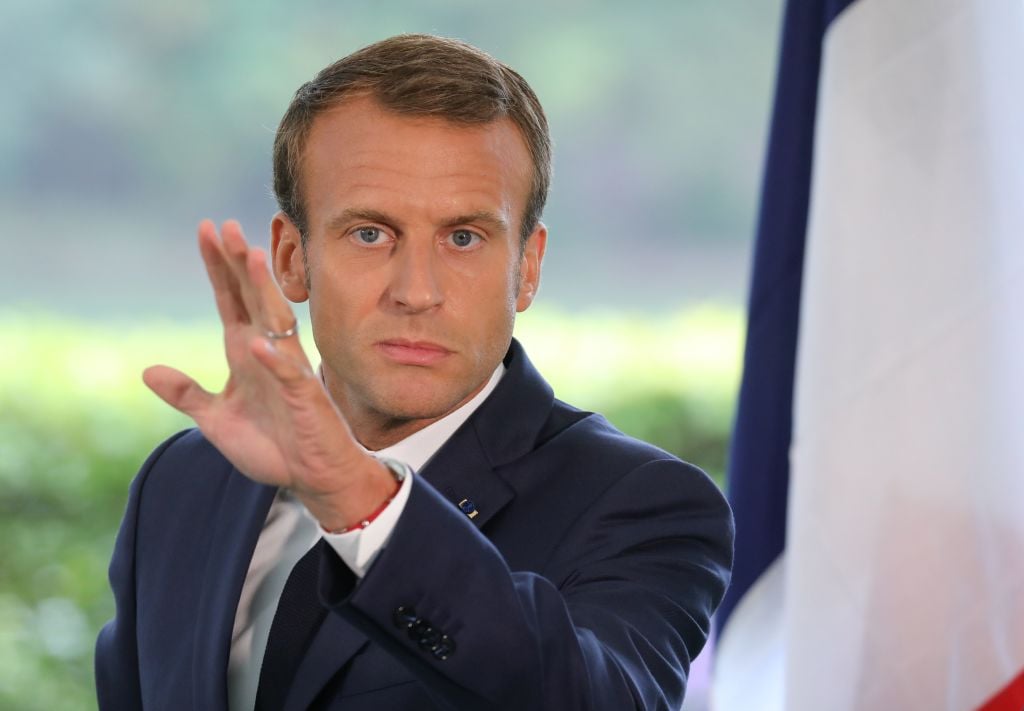
French President Emmanuel Macron, facing sharp criticism for his perceived lack of concern for the arts and culture industries during the pandemic, announced plans to buoy the fields during a video conference streamed from the presidential palace on Wednesday, May 6.
The roughly half-hour conversation was organized in response to mounting anger from the nation’s artists, performers, and cultural workers. On April 30, a group of them published an open letter in Le Monde reprimanding the President for “forgetting” the cultural sector, which employs 1.3 million people. Meanwhile, neighboring Germany has already begun to reopen and has handed out tens of millions of dollars to cultural workers.
Arriving to the conference with his sleeves quite literally rolled up, Macron outlined new plans to support workers. Here are a few key takeaways from the conference.
The Galerie Medicis at the Louvre in Paris. Photo by Matt Biddulph, courtesy of Wikimedia Commons.
A Gradual Reopening of Museums and Galleries
“We’re going to reopen museums, bookshops, record shops, [and] art galleries,” Macron said on the call, while also stressing that these places would need to adapt to social-distancing guidelines.
Lockdown measures in France will begin to ease on May 11, and Macron added that theaters and museums could start reopening on June 2.
“Cultural venues must be brought back to life,” he said. “Artists must be able to create again and to work together to reach audiences—even if, during this intermediary period, we’re going to have to rethink a new sort of relationship with audiences.”
Expanded Benefits for Performers and Entertainers
But with live festivals and performances canceled for the foreseeable future, the livelihoods of those working in the performing arts and entertainment sectors are hanging in the balance.
About 100,000 of those workers already receive special rights and privileges depending how many hours they log annually. During his call, Macron announced that these workers will have their unemployment benefits extended to August 31, 2021.
The announcement was generally met with satisfaction.
“This is a strong announcement that goes in the right direction,” Denis Gravouil, the secretary-general of Cgt Spectacle, a cinematography and audiovisual trade union, told Le Monde.
Culture Without a Public
Although Paris remains the epicenter of the pandemic in France, a national lockdown, as well as bans on gatherings of more than 5,000 people until at least August, have also led to the cancellation of regional summer art festivals, including the Avignon Festival, one of the most significant performing arts events in Europe.
Regions that remain relatively unaffected by the pandemic have lodged complaints, but Macron stressed during the conference that summer festivals cannot and will not take place, and said that the French public’s habits and expectations would have to change.
He said the coming months should be ones of “learning and culture,” as opposed to travel and leisure. (France has also imposed limits on international travelers for the summer months). He added that artists would need to invent new forms of culture, saying that “nothing prevents us from inventing something else, in smaller forms with no public or little public.”
An unusually empty square in front of the Louvre museum during Paris’s lockdown. Photo by Frédéric Soltan/Corbis via Getty Images.
Summer Camps and Promised Commissions
Criticism of Macron’s handling of the situation is largely rooted in the vagueness of his initiatives, with the Le Monde letter calling directly for a “precise plan.”
But Macron declined to present any specific details for his newly announced plan for artists to work with small groups of children in schools over the summer for several hours as a day.
He also promised a “large program of public commissions” that would be geared specifically to artists under 30, but did not present details.
More Mixed Messages
Macron also seemed to fumble his messages, suggesting that artists could work within schools a few minutes after saying that many artists should remain on unemployment.
Moreover, his repeated emphasis on supporting artists under 30 has confounded some onlookers.
“Artists of all ages should be helped; often older artists have more difficulty than younger artists as they don’t have a pension,” French artist Laurent Grasso told the Art Newspaper. “I’d be partisan to a campaign of public commissions that involves all the artistic fields and serves to interrogate this crisis and the world of the future.”